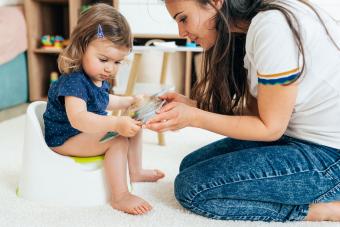
Parents who are beginning the potty training process sometimes wonder if there should be a connection between potty training and spanking. In other words, parents want to know if spanking is an effective potty training tool, and if punishing a child for wetting or soiling him or herself will prevent future accidents. According to pediatricians, the answer to this question is simply, "no."
Spanking: An Ineffective Potty Training Tool
Spanking has proven to be one of the least useful tools in teaching a child to use the toilet. Spanking can lead to physical problems with using the toilet, as well as lengthening the potty training process. Spanking can also cause kids to hide or lie about undesirable potty-related behavior, and this robs parents of the chance to stop bad habits before they start.
According to a study led by Dr. Timothy Schum, spanking is one of the least effective tools in potty training. Kids train faster and better with positive reinforcement such as a parent-provided potty chair, small treats, and verbal encouragement from parents. As kids learn to use the toilet more independently, parents can phase out the treats and rewards while maintaining the verbal encouragement. Also, spanking can easily turn into abuse if a parent is extremely angry. According to the American Academy of Pediatrics, abuse occurs more often during toilet training than during any other developmental stage in a child's life.
Spanking and Physical Toileting Problems
Kids are not born knowing how to use the toilet. The whole concept of potty training is that kids don't yet know the skills required to connect their urge to go to the bathroom with actually going to the toilet, pulling down their pants, and using the potty. Accidents happen when the child doesn't realize he or she has to go to the bathroom, or realizes too late and doesn't make it to the bathroom in time. When a parent spanks a child for the accident, it does not help the child to better connect the feeling of needing to go with the actions required to use the toilet.
The child may eventually associate the act of passing urine or stool with punishment and refuse to go to the toilet at all. Consistently holding in urine can contribute to bladder infections and eventually poor bladder control as the bladder becomes overdistended.
If a child refuses to pass his or her stool, fecal incontinence and impaction can result. This condition, called encopresis, can have serious long-term health effects and can be difficult to treat. Encopresis can also cause serious social and emotional difficulties, and the child may require extensive psychotherapy to resolve the condition.
Correcting Bad Habits
Spanking during the toilet training process does not decrease the number of accidents a child has. Rather than teaching the child to maintain better bladder and bowel control, it teaches the child to do anything necessary to avoid punishment. Instead of coming to a parent with wet or dirty pants, the child may simply hide the wet or soiled clothing and try to avoid the punishment that comes with having an accident.
It's much better to have the child experience the natural wetness or dirtiness that comes with having an accident. The parent can then have the child help clean up the accident by wiping up the floor, putting pants and underwear in the washer, and cleaning himself up with a wet washcloth or a bath, if necessary. The parent and child can then discuss how unpleasant it is to be wet or dirty, and how inconvenient it is to have to clean up the mess. Even a two year-old can understand that it's no fun to have to stop playing to do a load of laundry and take a bath.
Results of Potty Training and Spanking
Potty training and spanking can lead to serious physical abuse of a child. It does not teach the child to maintain better bowel and bladder control and may lead to physical problems caused by holding in urine or stool. Spanking may lengthen the time it takes to train a child or even delay potty training until a child is older. The best way to train a child is to wait until he or she is physically and mentally ready to train, and then to use positive reinforcement like sticker charts, small treats, and praise to encourage appropriate toileting behavior.







